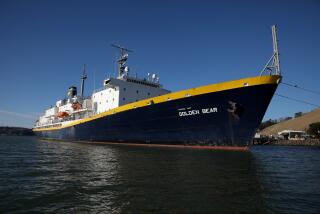Court Bars Women as Observers on Tuna Boats
- Share via
Declaring that “serious invasion of privacy issues” are at stake, a U.S. District Court judge Wednesday temporarily barred the government from forcing operators of a San Diego tuna boat fleet to carry a female observer aboard during fishing trips.
Granting a request by attorneys for Caribbean Marine Services Co. Inc., Judge William Enright issued a preliminary injunction blocking deployment of a woman observer on the Mariner and seven other tuna seiners operated by the company. The injunction replaced a temporary restraining order Enright granted Jan. 27.
At issue is a new policy by the National Marine Fisheries Service that allows women to join the ranks of observers who ride tuna boats and monitor the number of porpoises killed by the fishermen, whose large nets ensnare the mammals. The observers are assigned to ensure that fishermen do not exceed their quota of 20,500 porpoise kills a year; they also gather scientific data.
The American Tunaboat Assn., which represents 32 vessels in the local fishing fleet, has protested the placement of women on their boats, arguing that the presence of a female would create conflict on the cramped vessels and violate the crew’s right to privacy.
The U.S. attorney’s office, however, contends that barring women from the assignment constitutes job discrimination and denies females opportunities for advancement that are open to men who have served in the observer corps. Government officials insist that boat owners must comply with the change if they wish to obtain a license to fish the eastern Pacific.
On Wednesday, Judge Enright ruled on the second lawsuit filed in response to the agency’s new policy. On Jan. 21, Dominic Castagnola, skipper of the tuna seiner Antonina C, sued on grounds that the presence of a woman observer would violate his right to privacy and right “to be free of unreasonable searches and seizures.”
But Antonina C had already left port on Jan. 5 with Susan Taveras--one of four newly trained government observers--on board. Taveras’ departure ended a 15-year tradition of male-only observers; she was followed two weeks later by another woman, who set sail on the seiner Maria C.M.
During the 90-minute hearing Wednesday, attorneys for Caribbean Marine Services, San Diego’s largest tuna fleet operator, argued that placing a woman aboard a fishing boat for journeys lasting up to 100 days would create virtual chaos and forever change an industry that has survived as “a pristine male organization.”
“On a tuna boat, things are very cramped and there is simply no place to go to change clothes,” said attorney Keith Zakarin. “The seamen can not very well go up on deck to get dressed in the morning . . . while the woman hides behind a curtain.”
Showering, using the bathroom, sleeping and other ordinary daily functions would be impaired by the presence of a female on the vessel, Zakarin argued, noting that it would require “constant accommodations to protect the privacy” of the crew and the observer should a female be assigned.
Moreover, attorneys for the fishermen have expressed fears that the women observers--who will be required to bunk with as many as six men--could be subject to harassment and might subsequently sue the tuna boat owners.
There are “numerous problems that could occur when you drop a young woman in with five young men in close quarters over a period of months,” Caribbean Marine attorney Charles Froehlich warned.
But Assistant U.S. Atty. Karen Shichman called the argument that crew members “won’t be able to control their male urges” a “smokescreen” designed to bar women from jobs that should be open to them.
“Many (male) observers employed in the program as marine biologists have moved on to other posts based on that experience,” Shichman said. “To deny (women) that means one more opportunity is out of their reach.”
Shichman also labeled as “historically myopic” the industry’s argument that women should be barred from the tuna boats because it is a traditionally male industry, noting that firefighting and a slew of other professions have only recently become integrated.
She also argued that “minor inconvenience” on the part of tuna fishermen “will not interfere with their ability to catch as many fish as they can” and “by no means justifies employment discrimination.”
Enright, calling the case a “difficult” one, said he decided to issue the preliminary injunction in part because of “concerns that (placement of a woman aboard) goes too far in terms of invasion of privacy.”
The judge also noted that “the tuna industry is not as viable as it once was, and (the female observer policy) may be delivering a coup de grace to an industry that is under pressure on other fronts.
“Clearly, there are no accommodations at this point for protecting the privacy and dignity of the crew or the observer,” Enright said. Providing such protection “may be the answer,” he said, but such an issue should be decided at a future date.
The injunction, which covers all eight vessels operated by Caribbean Marine but does not apply to other seiners, will remain in effect either until a trial is held or the ruling is appealed to the 9th U.S. Circuit Court of Appeal.
More to Read
Sign up for Essential California
The most important California stories and recommendations in your inbox every morning.
You may occasionally receive promotional content from the Los Angeles Times.










